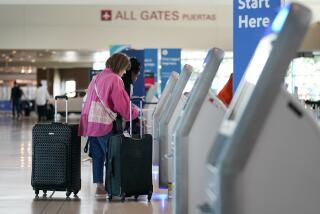Senate Acts to Ban Smoking on 70% of Airline Flights
- Share via
WASHINGTON — Despite vehement opposition by senators from tobacco-producing states, the Senate voted Thursday to ban cigarette smoking for the next two years on commercial airline flights scheduled for 90 minutes or less.
The measure, part of a spending bill providing $11.1 billion for the Transportation Department, would effectively snuff smoking on more than two-thirds of scheduled domestic flights if signed by President Reagan. The amendment was approved on a voice vote.
The legislation would reinforce a new California law banning smoking on intrastate flights. That law has been contested by the airline industry, which contends that only the federal government may regulate the airlines.
The Senate measure, a compromise worked out under the threat of a filibuster, is a watered-down version of a bill approved by the House in July that would ban smoking on flights of two hours or less for the next three years. The amendment approved by the Senate is limited to two years, after which a study would be conducted on the ban’s impact on health.
Ban Seen as Significant
Nevertheless, supporters hailed the measure as a significant step toward imposing the first federal regulations banning smoking on the nation’s airlines. The proposed ban would affect about 70% of all U.S. flights, according to the Federal Aviation Administration.
The amendment’s sponsor, Sen. Frank R. Lautenberg (D-N. J.), had warned that without Senate action “the airlines could face a Balkanized system with 50 different sets of rules regulating smoking.”
Differences between the House and Senate versions must be resolved by conferees. Other than the fact that the Senate measure would ban smoking on fewer flights and for only two years, the most significant difference is that the House would have airport operators enforce the ban but the Senate would punish violators with fines of up to $1,000.
However, Administration officials have warned they will urge a veto of the entire Transportation Department bill because it would provide $3.4 billion more than the White House had requested.
Also, the Administration has called the smoking ban “objectionable” because “empirical evidence on the effects of smoking on nonsmokers is still lacking.”
Dole Rejected Action
Congressional support for an airline smoking ban had been gathering since February, when Transportation Secretary Elizabeth Hanford Dole rejected a National Academy of Sciences recommendation that smoking be banned on all domestic commercial flights and said that more study was necessary.
“The study has been done,” Lautenberg said as debate opened Wednesday, “and now it’s time to act.”
But Sen. Jesse Helms (R-N. C.), who led the opposition to the legislation, said the research had not been authoritative and complained that the measure had been introduced “without hearings and without debate,” sending a “pretty dismal message to 200,000 small family tobacco farmers in 23 states.”
Helms and other Southern senators, protesting that a “harsh measure with no recourse is being rammed down our throats,” had threatened to filibuster against the original, more stringent measure. To avoid legislative deadlock, Senate Majority Leader Robert C. Byrd (D-W. Va.) pressured Lautenberg to agree to a compromise with Helms and the other opponents.
Opposed by Pilots
The measure was bitterly opposed by a well-financed lobbying effort by the tobacco industry and airline pilots, but it had the support of a large coalition of anti-smoking activists.
“This is a marvelous first step, but it could have been a better first step,” anti-smoking lobbyist Aaron Leichtman said. “It’s really an example of what happens when politics is played with a health and safety issue.”
The Transportation Department bill, to which the smoking ban was attached, was passed 84 to 10. It provides $4.7 billion for the FAA in the next fiscal year, a 19% increase over last year that was prompted by widespread congressional concern about the safety of the aviation system.
Much of the additional funding will be used to speed modernization of the nation’s air traffic control system and to hire about 675 new controllers, bringing the total to 15,800. That number is still 200 short of the total in the system before Reagan fired controllers for striking illegally in 1981.
Funds for Coast Guard
Other parts of the bill provide $2.7 billion for Coast Guard operations and drug interdiction, $2.1 billion for urban transit systems and $614 million for Amtrak, the federally supported passenger railways.
The measure would also permit the expenditure of $15.1 billion for highways, mass transit and airports and the air traffic control system from federal trust funds, which are supported by taxes on tickets and fuel.
More to Read
Get the L.A. Times Politics newsletter
Deeply reported insights into legislation, politics and policy from Sacramento, Washington and beyond. In your inbox twice per week.
You may occasionally receive promotional content from the Los Angeles Times.








